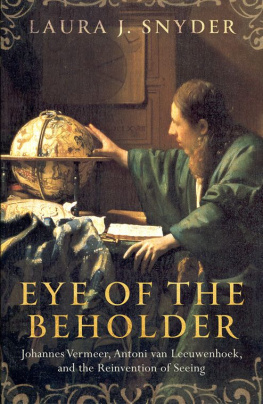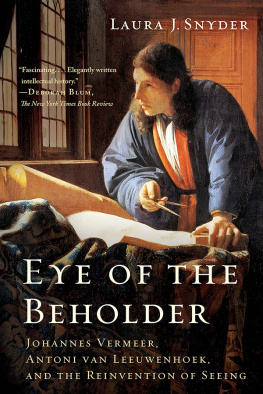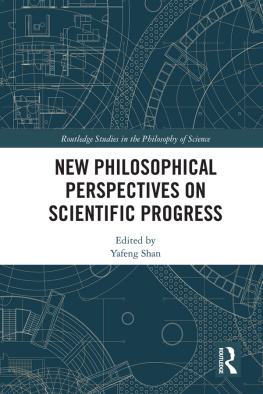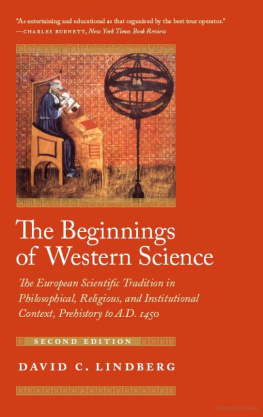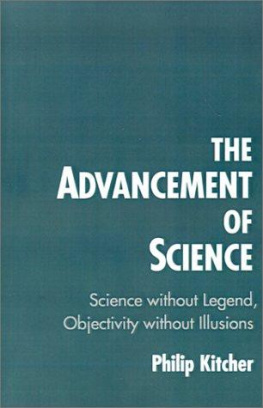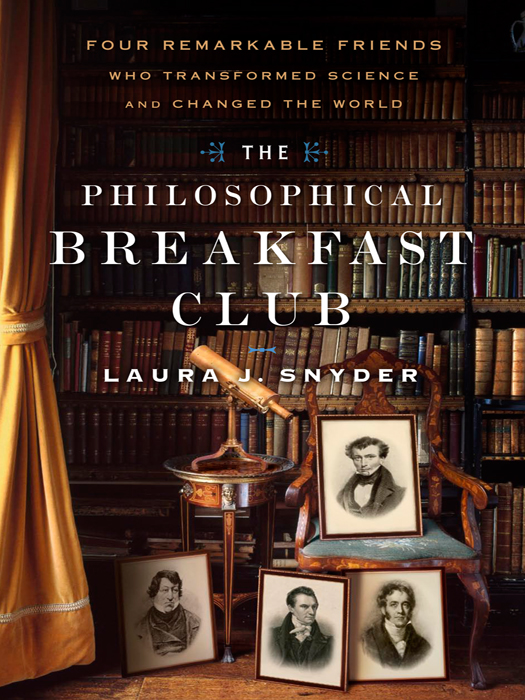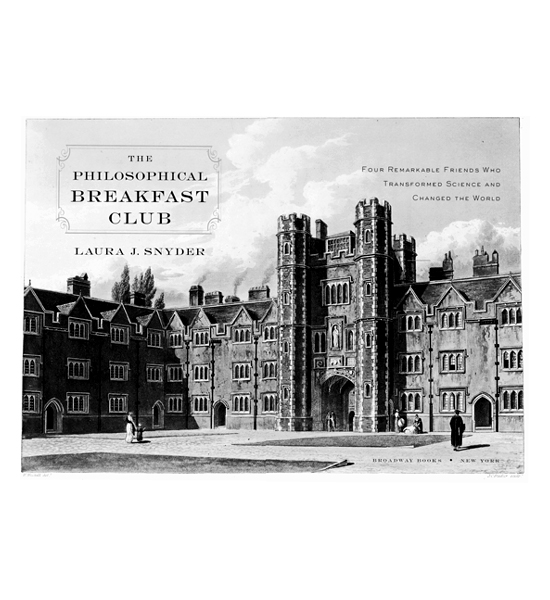
Copyright 2011 by Laura J. Snyder
All rights reserved.
Published in the United States by Broadway Books, an imprint of the Crown Publishing Group, a division of Random House, Inc., New York.
www.crownpublishing.com
BROADWAY BOOKS and the Broadway Books colophon are trademarks of Random House, Inc.
Library of Congress Cataloging-in-Publication Data
Snyder, Laura J.
The philosophical breakfast club: four remarkable friends who transformed science and changed the world / Laura Snyder. 1st ed.
p. cm.
1. ScientistsGreat BritainIntellectual life19th century.
2. SciencePhilosophy. 3. ScientistsGreat BritainBiography.
I. Title.
Q141.S5635 2010
509.2241dc22 2010025790
eISBN: 978-0-307-71617-0
Title page art: from A History of the University of Cambridge by William Combe (London: for Rudolph Ackermann, 1815)
Jacket design by Evan Gaffney
Jacket photographs: background image: Elizabeth Whiting & Associates; portraits of Whewell, Herschel, Babbage: Mary Evans Picture Library
v3.1
For Leo,
a natural philosopher
C ONTENTS
PROLOGUE
INVENTING THE SCIENTIST
How much has happened in these 50 yearsa period more remarkable than any, I will continue to say, in the annals of mankind. I am not thinking of the rise and fall of Empires, the change of dynasties, the establishment of governments. I am thinking of those revolutions of science which have had much more effect than any political causes, which have changed the position and prospects of mankind more than all the conquests and the codes, and all the legislators that ever lived.
BENJAMIN DISRAELI, 1873
O N J UNE 24, 1833, THE B RITISH A SSOCIATION FOR THE A DVANCEMENT of Science convened its third meeting. Eight hundred fifty-two paid-up members of the fledgling society had traveled to Cambridge from throughout England, from Scotland and Ireland, and even from the Continent and America, to attend. At the first General Meeting the membersand many of their wives and daughterscrowded into the grand and imposing Senate House of the university. The atmosphere was charged with barely suppressed excitement and anticipation as the audience watched one of the speakers take his place on the stage before them. It was William Whewella tall, robust man in his late thirties, renowned for the brawn of his muscles and the brilliance of his mind. At Cambridge he was a star: outspoken fellow of Trinity College, recently resigned as Professor of Mineralogy, the author of a number of physics textbooks and a new, provocative work on the relation between science and religion. In less than a decade he would surprise no one by being appointed Master of Trinity, the most powerful position at the university; some would say the most powerful position in the entire academic world. Whewell was one of the guiding lights in the formation of the British Association, and he was the proud host of the Cambridge meeting.
As the applause died down, one man rose imperiously. It was, the other members realized with some surprise, Samuel Taylor Coleridge, the celebrated Romantic poet. Decades earlier, Coleridge had written a tract on scientific method. Although for the last thirty years he had rarely left his home in Highgate, near Hampstead, he had felt obliged to make the long journey back to his alma mater for the British Association meeting. It would be the last of such trips; he died within the year. His intervention in the meeting would have far-reaching consequences for those who practice science, even to the present day.
These practitioners were, at the time, known as men of science (they were rarely women in those days), savants (using the French word for a man of great learning), orbeckoning back to the close-knit relation between science and philosophy that had existed since ancient timesnatural philosophers. Coleridge remarked acidly that the members of the association should no longer refer to themselves as natural philosophers. Men digging in fossil pits, or performing experiments with electrical apparatus, hardly fit the definition; they were not, as he might have said, armchair philosophers pondering the mysteries of the universe, but practical men, with dirty hands at that. Indeed, Coleridge persisted, as a real metaphysician, he forbade them the use of this honorific.
The hall erupted in a tumultuous din, as the assembled group took offense at Coleridges sharp insult. Then Whewell rose once again, and quieted the crowd. He courteously agreed with the distinguished gentleman that a satisfactory term with which to describe the members of the
That the coining of this term occurred when, where, and by whom it did was no accident; rather, it was the culmination of twenty years of work by four remarkable men, Whewell and three of his friends. It was also, in some ways, merely the beginning of their labors, for the term, thus launched, was not to be widely used for decades more.
T HE FOUR HAD met at Cambridge, at the very site of this creation of the scientist. Two decades earlier, as students, Whewell and his friends Charles Babbage, John Herschel, and Richard Jones had come together to discuss the themes that Whewell touched upon in his 1833 address. The importance of Francis Bacon, the need to carry out the reforms he had foreseen two centuries before, the role for both observation and reasoning in science: all of this had been the fodder for Philosophical Breakfasts fondly recalled by the four in later years.
At these Sunday morning meetings, the four students had cast their young, critical eyes over science as it was currently practiced, and found it wanting. They saw an area of inquiry perceived as the private pursuit of wealthy men, unsupported and unheralded by the public. No one was paid to conduct scientific research; the universities barely supported the experiments of their chemistry professors; students could not even receive degrees in the natural sciences at Cambridge and Oxford; no honors, no peerages or monetary rewards, were offered for scientific innovation. Within science itself, its practitioners rarely met, and never debated publicly about their work; even at the Royal Society of London, that bastion of natural philosophy since the time of Isaac Newton, scientific papers were read, but never discussed or opposed. Indeed, its members were often not even men of science, but antiquarians, literary figures, or noblemen who wished to associate with the philosophers.
Moreover, there was no agreed-upon scientific method, no one process of discovering theories that was sanctioned above any other. Worse, there was a disquieting trend toward a kind of scientific reasoning the four men thought was not only sterile, leading to no new knowledge, but outright dangerous in its consequences. And while science had long been employed in the service of the state, of kings and governments, it was not generally accepted that science should be used to improve the lives of common men and women. It was to these friends as if the old medieval system of alchemy, with its secret methods and its mysteries, its discoveries hidden by codes and ciphers, its riches reserved for its practitioners, still held knowledge of the physical world in its grip. It was no surprise, they felt, that science was stagnating.


